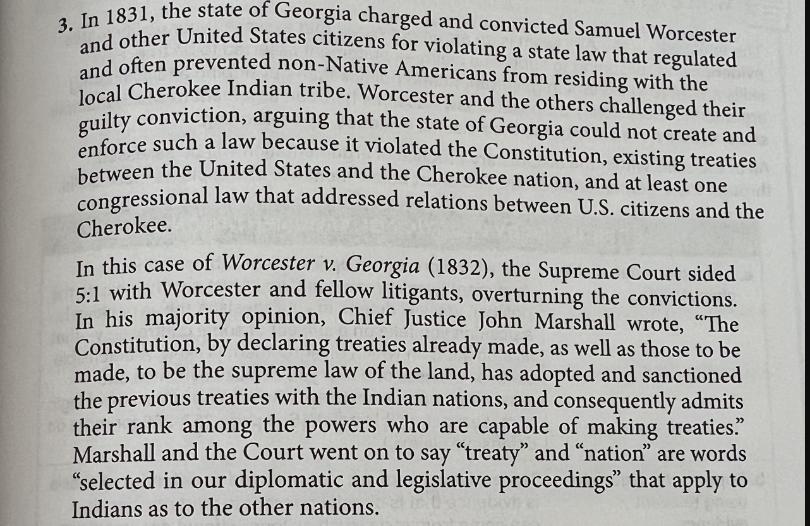Answered step by step
Verified Expert Solution
Question
1 Approved Answer
3. In 1831, the state of Georgia charged and convicted Samuel Worcester and other United States citizens for violating a state law that regulated

3. In 1831, the state of Georgia charged and convicted Samuel Worcester and other United States citizens for violating a state law that regulated and often prevented non-Native Americans from residing with the local Cherokee Indian tribe. Worcester and the others challenged their guilty conviction, arguing that the state of Georgia could not create and enforce such a law because it violated the Constitution, existing treaties between the United States and the Cherokee nation, and at least one congressional law that addressed relations between U.S. citizens and the Cherokee. In this case of Worcester v. Georgia (1832), the Supreme Court sided 5:1 with Worcester and fellow litigants, overturning the convictions. In his majority opinion, Chief Justice John Marshall wrote, "The Constitution, by declaring treaties already made, as well as those to be made, to be the supreme law of the land, has adopted and sanctioned the previous treaties with the Indian nations, and consequently admits their rank among the powers who are capable of making treaties." Marshall and the Court went on to say "treaty" and "nation" are words "selected in our diplomatic and legislative proceedings" that apply to Indians as to the other nations.
Step by Step Solution
There are 3 Steps involved in it
Step: 1
The key points in this case are 1 In 1831 the state of Georgia charged and convicted Samuel Worceste...
Get Instant Access to Expert-Tailored Solutions
See step-by-step solutions with expert insights and AI powered tools for academic success
Step: 2

Step: 3

Document Format ( 2 attachments)
66421ae5bb34c_986266.pdf
180 KBs PDF File
66421ae5bb34c_986266.docx
120 KBs Word File
Ace Your Homework with AI
Get the answers you need in no time with our AI-driven, step-by-step assistance
Get Started


